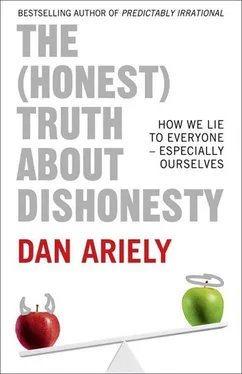Ariely, Dan - The (Honest) Truth About Dishonesty - How We Lie to Everyone – Especially Ourselves
Здесь есть возможность читать онлайн «Ariely, Dan - The (Honest) Truth About Dishonesty - How We Lie to Everyone – Especially Ourselves» весь текст электронной книги совершенно бесплатно (целиком полную версию без сокращений). В некоторых случаях можно слушать аудио, скачать через торрент в формате fb2 и присутствует краткое содержание. Жанр: Старинная литература, на английском языке. Описание произведения, (предисловие) а так же отзывы посетителей доступны на портале библиотеки ЛибКат.
- Название:The (Honest) Truth About Dishonesty: How We Lie to Everyone – Especially Ourselves
- Автор:
- Жанр:
- Год:неизвестен
- ISBN:нет данных
- Рейтинг книги:4 / 5. Голосов: 1
-
Избранное:Добавить в избранное
- Отзывы:
-
Ваша оценка:
- 80
- 1
- 2
- 3
- 4
- 5
The (Honest) Truth About Dishonesty: How We Lie to Everyone – Especially Ourselves: краткое содержание, описание и аннотация
Предлагаем к чтению аннотацию, описание, краткое содержание или предисловие (зависит от того, что написал сам автор книги «The (Honest) Truth About Dishonesty: How We Lie to Everyone – Especially Ourselves»). Если вы не нашли необходимую информацию о книге — напишите в комментариях, мы постараемся отыскать её.
The (Honest) Truth About Dishonesty: How We Lie to Everyone – Especially Ourselves — читать онлайн бесплатно полную книгу (весь текст) целиком
Ниже представлен текст книги, разбитый по страницам. Система сохранения места последней прочитанной страницы, позволяет с удобством читать онлайн бесплатно книгу «The (Honest) Truth About Dishonesty: How We Lie to Everyone – Especially Ourselves», без необходимости каждый раз заново искать на чём Вы остановились. Поставьте закладку, и сможете в любой момент перейти на страницу, на которой закончили чтение.
Интервал:
Закладка:
Making Fudge
Clearly there’s a lot more going on here than Becker and standard economics would have us believe. For starters, the finding that the level of dishonesty is not influenced to a large degree (to any degree in our experiments) by the amount of money we stand to gain from being dishonest suggests that dishonesty is not an outcome of simply considering the costs and benefits of dishonesty. Moreover, the results showing that the level of dishonesty is unaltered by changes in the probability of being caught makes it even less likely that dishonesty is rooted in a cost-benefit analysis. Finally, the fact that many people cheat just a little when given the opportunity to do so suggests that the forces that govern dishonesty are much more complex (and more interesting) than predicted by the SMORC.
What is going on here? I’d like to propose a theory that we will spend much of this book examining. In a nutshell, the central thesis is that our behavior is driven by two opposing motivations. On one hand, we want to view ourselves as honest, honorable people. We want to be able to look at ourselves in the mirror and feel good about ourselves (psychologists call this ego motivation). On the other hand, we want to benefit from cheating and get as much money as possible (this is the standard financial motivation). Clearly these two motivations are in conflict. How can we secure the benefits of cheating and at the same time still view ourselves as honest, wonderful people?
This is where our amazing cognitive flexibility comes into play. Thanks to this human skill, as long as we cheat by only a little bit, we can benefit from cheating and still view ourselves as marvelous human beings. This balancing act is the process of rationalization, and it is the basis of what we’ll call the “fudge factor theory.”
To give you a better understanding of the fudge factor theory, think of the last time you calculated your tax return. How did you make peace with the ambiguous and unclear decisions you had to make? Would it be legitimate to write off a portion of your car repair as a business expense? If so, what amount would you feel comfortable with? And what if you had a second car? I’m not talking about justifying our decisions to the Internal Revenue Service (IRS); I’m talking about the way we are able to justify our exaggerated level of tax deductions to ourselves.
Or let’s say you go out to a restaurant with friends and they ask you to explain a work project you’ve been spending a lot of time on lately. Having done that, is the dinner now an acceptable business expense? Probably not. But what if the meal occurred during a business trip or if you were hoping that one of your dinner companions would become a client in the near future? If you have ever made allowances of this sort, you too have been playing with the flexible boundaries of your ethics. In short, I believe that all of us continuously try to identify the line where we can benefit from dishonesty without damaging our own self-image. As Oscar Wilde once wrote, “Morality, like art, means drawing a line somewhere.” The question is: where is the line?
I THINK JEROME K. JEROMEgot it right in his 1889 novel, Three Men in a Boat (to Say Nothing of the Dog) , in which he tells a story about one of the most famously lied-about topics on earth: fishing. Here’s what he wrote:
I knew a young man once, he was a most conscientious fellow and, when he took to fly-fishing, he determined never to exaggerate his hauls by more than twenty-five per cent.
“When I have caught forty fish,” said he, “then I will tell people that I have caught fifty, and so on. But I will not lie any more than that, because it is sinful to lie.”
Although most people haven’t consciously figured out (much less announced) their acceptable rate of lying like this young man, this overall approach seems to be quite accurate; each of us has a limit to how much we can cheat before it becomes absolutely “sinful.”
Trying to figure out the inner workings of the fudge factor—the delicate balance between the contradictory desires to maintain a positive self-image and to benefit from cheating—is what we are going to turn our attention to next.
CHAPTER 2
Fun with the Fudge Factor
Here’s a little joke for you:
Eight-year-old Jimmy comes home from school with a note from his teacher that says, “Jimmy stole a pencil from the student sitting next to him.” Jimmy’s father is furious. He goes to great lengths to lecture Jimmy and let him know how upset and disappointed he is, and he grounds the boy for two weeks. “And just wait until your mother comes home!” he tells the boy ominously. Finally he concludes, “Anyway, Jimmy, if you needed a pencil, why didn’t you just say something? Why didn’t you simply ask? You know very well that I can bring you dozens of pencils from work.”
If we smirk at this joke, it’s because we recognize the complexity of human dishonesty that is inherent to all of us. We realize that a boy stealing a pencil from a classmate is definitely grounds for punishment, but we are willing to take many pencils from work without a second thought.
To Nina, On, and me, this little joke suggested the possibility that certain types of activities can more easily loosen our moral standards. Perhaps, we thought, if we increased the psychological distance between a dishonest act and its consequences, the fudge factor would increase and our participants would cheat more. Of course, encouraging people to cheat more is not something we want to promote in general. But for the purpose of studying and understanding cheating, we wanted to see what kinds of situations and interventions might further loosen people’s moral standards.
To test this idea, we first tried a university version of the pencil joke: One day, I sneaked into an MIT dorm and seeded many communal refrigerators with one of two tempting baits. In half of the refrigerators, I placed six-packs of Coca-Cola; in the others, I slipped in a paper plate with six $1 bills on it. I went back from time to time to visit the refrigerators and see how my Cokes and money were doing—measuring what, in scientific terms, we call the half-life of Coke and money.
As anyone who has been to a dorm can probably guess, within seventy-two hours all the Cokes were gone, but what was particularly interesting was that no one touched the bills. Now, the students could have taken a dollar bill, walked over to the nearby vending machine and gotten a Coke and change, but no one did.
I must admit that this is not a great scientific experiment, since students often see cans of Coke in their fridge, whereas discovering a plate with a few dollar bills on it is rather unusual. But this little experiment suggests that we human beings are ready and willing to steal something that does not explicitly reference monetary value—that is, something that lacks the face of a dead president. However, we shy away from directly stealing money to an extent that would make even the most pious Sunday school teacher proud. Similarly, we might take some paper from work to use in our home printer, but it would be highly unlikely that we would ever take $3.50 from the petty-cash box, even if we turned right around and used the money to buy paper for our home printer.
To look at the distance between money and its influence on dishonesty in a more controlled way, we set up another version of the matrix experiment, this time including a condition where cheating was one step removed from money. As in our previous experiments, participants in the shredder condition had the opportunity to cheat by shredding their worksheets and lying about the number of matrices they’d solved correctly. When the participants finished the task, they shredded their worksheet, approached the experimenter, and said, “I solved X *matrices, please give me X dollars.”
Читать дальшеИнтервал:
Закладка:
Похожие книги на «The (Honest) Truth About Dishonesty: How We Lie to Everyone – Especially Ourselves»
Представляем Вашему вниманию похожие книги на «The (Honest) Truth About Dishonesty: How We Lie to Everyone – Especially Ourselves» списком для выбора. Мы отобрали схожую по названию и смыслу литературу в надежде предоставить читателям больше вариантов отыскать новые, интересные, ещё непрочитанные произведения.
Обсуждение, отзывы о книге «The (Honest) Truth About Dishonesty: How We Lie to Everyone – Especially Ourselves» и просто собственные мнения читателей. Оставьте ваши комментарии, напишите, что Вы думаете о произведении, его смысле или главных героях. Укажите что конкретно понравилось, а что нет, и почему Вы так считаете.












